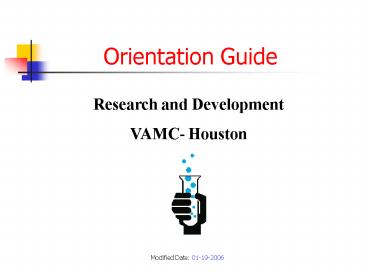Orientation Guide - PowerPoint PPT Presentation
1 / 17
Title: Orientation Guide
1
Orientation Guide
Research and Development VAMC- Houston
Modified Date 01-19-2006
2
Adverse Events
- It is important to stress reporting of any
adverse events. - With permission of our friends and colleagues at
Baylor we have included the following
presentation
3
What is An Adverse Event
- An unanticipated problem that involves risks or
potential harm to study subjects. - Any untoward (serious and unexpected) medical
occurrence presenting during treatment or
administration with a pharmaceutical product or
device that may or may not have a casual
relationship with the treatment.
4
Types of Adverse Events
Serious AEs Include death, an acute life
threatening event (ALTE), a permanently disabling
experience, hospitalization that is precipitated
by or prolonged by an adverse experience, a
congenital anomaly, the development of cancer, a
drug overdose, or in the physicians judgment, an
experience that qualifies as such. Unexpected
AEs Are defined as any adverse events that are
not identified in nature, severity, or frequency
in the investigators brochure or described in
the research protocol.
5
What and When to Report
All serious events that occur while a subject is
enrolled in a clinical research study, or within
30 days of completing a study at BCM or its
affiliated hospitals must be reported to the IRB.
SERIOUS AES WHETHER EXPECTED OR UNEXPECTED,
MUST BE REPORTED EVEN IF THERE IS NO PERCEIVED
CONNECTION TO THE RESEARCH.
6
What and When to Report
- All unexpected deaths and ALTEs, including grade
4 toxicities, whether related or unrelated to the
drug or device, must be reported verbally, by fax
or email within 48-72 hours. A report must be
submitted via BRAIN within 10 working days. - All expected serious AEs, including deaths and
ALTEs must be reported in BRAIN within the same
year of occurrence.
7
What and When to Report
- In the absence of chronic underlying disease,
the occurrence of a death or ALTE in an otherwise
healthy individual, whether related to the
research or not, should be reported (email)
promptly within 48-72 hours by the PI to the IRB.
A report must be submitted via BRAIN within 10
days. - All non-serious AEs may be reported to the IRB
at the PIs discretion.
8
What and When to Report
All IND reports that the Sponsor has requested
to be submitted to the IRB can be sent on a
disk/CD or as a hard copy as well as submitting
into BRAIN only listing the IND report numbers in
Description.
9
Who Reports AEs and SAEs
- Although Coordinators/Administrative staff may
report AEs SAEs, the PI is ultimately
responsible for the reporting of events that
occur at BCM as well as the affiliated hospitals. - All AEs and SAEs must be reported to the BCM
IRB _at_ 713.798.6990 (fax) or irb_at_bcm.tmc.edu. - After reporting AEs and/or SAEs, they must be
entered into BRAIN and submitted to the Office of
Research for review _at_VAAE_at_bcm.tmc.edu
10
Other Documentation to Report
- PI should send any supporting documentation that
may be beneficial for the IRB to review. - Progress reports are required if the
complications of the AE have not been resolved at
the time the original report was submitted. - For multi-center trials, the PI should forward
the DSMB summary report of AEs to the IRB
whenever a review takes place.
11
IRB Response to AEs
- Serious AEs BCM
- Are promptly reviewed (through BRAIN) by an IRB
Chair or Vice-Chair. - After review, the Chair or Vice-chair will
approve the AE, or request that modifications be
made to the protocol and/or the consent form.
The Chair or Vice-chair may request that
enrollment be stopped until a proper plan is
developed. - All modifications requested will be returned to
the PI via BRAIN.
12
IRB response to AEs cont.
- Serious AEs Non-BCM
- Are acknowledged by BRAIN within 24 hours of
receipt. - Non-Serious AEs Non-BCM
- Are acknowledged by BRAIN within 24 hours of
receipt.
13
Emergency Unexpected AEs
- If a situation arises in which an unexpected,
related SAE occurs and requires an emergent
change in the protocol, the following should
occur - The PI contacts the IRB to inform of SAE.
- One of the Chairs communicates with the PI
regarding the steps which need to be followed. - Enrollment must stop immediately.
- PI must submit SAE report via BRAIN within 48
hours.
14
Emergency Unexpected AEs
- PI must also submit a written report to the IRB
Executive Committee providing a plan to ensure
safety of subjects. - This plan must be reviewed by Dept. Chair for
adequacy before submission to the IRB. - Once submitted to IRB plan is reviewed and PI
will receive instructions on how to proceed.
15
Office of Research/IRB Staff Contact
Brady Duke bduke_at_bcm.tmc.edu 713-798-7213 Bridge
t Fagbeyiro fagbeyir_at_bcm.tmc.edu
713-798-5308 Charles Imo cimo_at_bcm.tmc.edu 713-79
8-7692 Miguel Aguirre
aguirre_at_bcm.tmc.edu 713-798-2011
16
Reporting Adverse Events to The Research and
Development Office
17
Reporting AEs to RD
Coordinator or PI
Deaths/ Serious AEs Within 24 hours 1.
Report in BRAIN 2. Call Baylor IRB 713-798-6970
or Email _at_ IRB_at_bcm.tmc.edu if brain is not
working 3. Call VA RD- for ALL DEATHS -Marilyn
Crosby RN Phone 713-794-8096 or Joyce McDaniel
phone 713-794-7564 with protocol number and
Adverse Event number/patient initial and last
four numbers of SSN Email all other Adverse
Events To VAAE_at_bcm.tmc.edu 4. Write a note in
CPRS
Other Adverse Events 1. Report in Brain within 10
days (med watch, have to be reported within one
year)
Adverse Event Death or any medical occurrence
that is considered unfavorable or unintended (if
in doubt, report it).




























![[PDF] Fast Facts for the Neonatal Nurse: A Nursing Orientation and Care Guide in a Nutshell Ipad PowerPoint PPT Presentation](https://s3.amazonaws.com/images.powershow.com/10079913.th0.jpg?_=20240717023)
![[PDF] Fast Facts for the Neonatal Nurse: A Nursing Orientation and Care Guide in a Nutshell 1st Edition, Kindle Edition Ipad PowerPoint PPT Presentation](https://s3.amazonaws.com/images.powershow.com/10079914.th0.jpg?_=20240717024)

